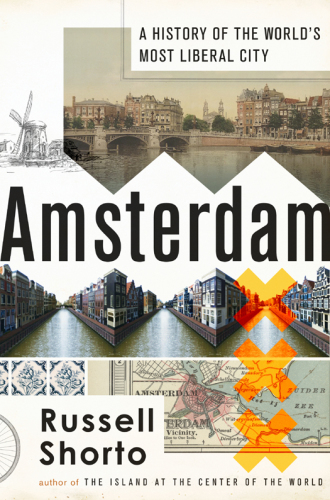
Amsterdam
A History of the World's Most Liberal City
کتاب های مرتبط
- اطلاعات
- نقد و بررسی
- دیدگاه کاربران
نقد و بررسی

Starred review from August 12, 2013
Shorto conjures the anything-goes spirit of contemporary Amsterdam, with its pot-smoking and red-light districts, from the city’s fascinating past as a major port city. Amsterdam, to Shorto, was not only the first city in Europe to develop the cultural and political foundations of what we now call liberalism—“a society focused on the concerns and comforts of individuals,... run by individuals acting together,” and tolerant of “religion, ethnicity, or other differences”—but also an exporter of these beliefs to the rest of Europe and the New World. Shorto composes biographical sketches of these originators (Rembrandt, Spinoza) and exporters (John Locke, the Dutch East India Company) as he guides readers on a narrative tour of Amsterdam’s intellectual history, its rise from a sleepy site of religious pilgrimage to the center of a trading empire into the present. Shorto’s examination of Dutch tolerance also focuses on its failures, including an examination of collaboration with Nazi occupiers during WWII, and its current struggle to integrate its “immigrant underclass” into a more egalitarian multicultural life. Shorto’s brilliant follow-up to his previous book on Dutch Manhattan (The Island at the Center of the World) is an expertly told history of a city of new, shocking freedoms and the tough-minded people that developed them. Agent: Anne Edelstein, Anne Edelstein Literary Agency LLC.

Starred review from August 1, 2013
The dynamic historical account of a vibrantly complex European city and the legacy of social, political and economic liberalism it bequeathed to the Western world. Legalized prostitution, lax drug laws and a generous social welfare system have given Amsterdam a reputation for being "the most liberal place on earth." But as cultural historian Shorto (Descartes' Bones: A Skeletal History of the Conflict between Faith and Reason, 2008, etc.) points out, it is ultimately incorrect to say that the concept of liberalism itself, which "involves a commitment to individual freedom and individual rights...for everyone," was born there. It is instead more correct to say that the ideas that inspired those thinkers who gave form to what liberalism was--John Locke, Voltaire, Adam Smith and Thomas Jefferson, among others--arose from the peculiar set of geographical and cultural circumstances that attended the birth of Amsterdam. Since the Netherlands is "one vast river delta," Dutch cities like Amsterdam came into being thanks to the development of organizations that depended on cooperation to deal with the ever-present threat of flooding. More importantly, the water-protected communities the Dutch built allowed them the freedom to also flourish as individuals. A spirit of tolerance pervaded all aspects of Dutch life. Medieval Amsterdam became home to religious dissidents. With the rise of mercantilism in the 16th century, it became headquarters of the United East India Company, "the world's first multinational corporation." Economic liberalism transformed Amsterdam into a rich cosmopolitan city, and wealth gave rise to a golden age in art, architecture and science. When the capitalistic excesses of the Industrial Revolution collided with socialist theory in the 19th and 20th centuries, a liberalism that honored the good of all, rather than just a privileged few, emerged. Shorto's examination of Amsterdam's colorful history offers important insights into the promise and possibility of enlightened liberalism. Vigorous, erudite and eminently readable.
COPYRIGHT(2013) Kirkus Reviews, ALL RIGHTS RESERVED.

























دیدگاه کاربران